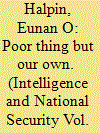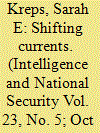|
|
|
Sort Order |
|
|
|
Items / Page
|
|
|
|
|
|
|
| Srl | Item |
| 1 |
ID:
084062


|
|
|
|
|
| Publication |
2008.
|
| Summary/Abstract |
At the end of the Second World War, British and Zionist interests came into conflict over the issue of Jewish immigration to Palestine, which raised the broader issue of what sort of National Home could exist within the British Mandate. As a result, in 1945-46, the three Jewish armed groups in the Mandate, the Haganah, Etzel and Lehi, started a loosely coordinated armed struggle against British rule. Even the moderates in the Jewish Agency rejected their former partner against Hitler, Britain, and used force against it in order to achieve their political goals. This article assesses British intelligence on these developments, and demonstrates that it failed to anticipate or even to understand the threat until the destruction of the King David Hotel. The article demonstrates that these mistakes occurred because British intelligence relied heavily on the intelligence organs of the Jewish Agency itself for intelligence about political threats within Palestine. The article assesses this intelligence failure, and its heavy costs. However, it denies that bad intelligence caused British failures in the Mandate. On the contrary, that failure stemmed from deeper problems of policy.
|
|
|
|
|
|
|
|
|
|
|
|
|
|
|
|
| 2 |
ID:
084060


|
|
|
| 3 |
ID:
084065


|
|
|
|
|
| Publication |
2008.
|
| Summary/Abstract |
This study examines the role played by GCHQ during the 1960s. It looks at GCHQ's overseas Sigint collection network, its relationship with the NSA and the problems caused by decolonization, economic crisis and military withdrawal from East of Suez. The paper also discusses GCHQ's intelligence targets in the 1960s, its codebreaking successes and assesses how important Sigint was for British policy towards France, Egypt and Indonesia. It concludes that while Sigint gave Britain tactical benefits in dealing with France and Egypt it was only in the case of Indonesia that Sigint helped Britain to achieve its strategic goals.
|
|
|
|
|
|
|
|
|
|
|
|
|
|
|
|
| 4 |
ID:
084066


|
|
|
|
|
| Publication |
2008.
|
| Summary/Abstract |
Partisan behaviour and abuses by intelligence and security agencies have often been attributed to the fact that agencies have become 'out of control' or 'rogue elephants'. But a detailed empirical study of the politicization of the Australian Security Intelligence Organization (ASIO) over ten years shows that the agency was not 'out of control' but very much under the control of its minister. The partisan use of security information arose from directives issued through the 'democratic' control exercised by a government. On the basis of this study, prevention of abuses by tighter governmental control is unlikely to work. A combination of government control, autonomy of the agency and independent scrutiny by an inspector-general is more likely to succeed.
|
|
|
|
|
|
|
|
|
|
|
|
|
|
|
|
| 5 |
ID:
084064


|
|
|
|
|
| Publication |
2008.
|
| Summary/Abstract |
This article explores the role of the Joint Intelligence Committee (JIC) in assessing the development of the Northern Ireland crisis from the mid-1960s until the imposition of direct rule in 1972. It argues that the JIC's very limited engagement with Northern Ireland prior to 1969 contributed significantly to Whitehall's failure to grasp the drift of affairs from the autumn of 1968 onwards. This was due to the JIC's preoccupation with Cold War issues, compounded by reluctance to interfere in the security affairs of the Northern Ireland government. When Northern Ireland became a stock item of JIC business in 1970, the JIC secretariat became heavily involved in efforts to improve the intelligence system in Northern Ireland. The article also raises the question of the JIC's role in establishing the parameters for intelligence and security operations concerning Northern Ireland, including the controversial 'Five Techniques' of interrogation, the introduction of internment in 1971, and covert activities in the Republic of Ireland. The article draws mainly on JIC, Prime Minister's Office and Foreign Office records in the National Archives.
|
|
|
|
|
|
|
|
|
|
|
|
|
|
|
|
| 6 |
ID:
084061


|
|
|
|
|
| Publication |
2008.
|
| Summary/Abstract |
Lost in the political fallout of the Iran National Intelligence Estimate (NIE) of 2007 was any discussion about historical parallels and what those might say about intersection between intelligence, policy, and politics. This article argues that the NIEs on the ballistic missile threat of the 1990s offer a useful analogy. In a short period of time, the NIE's assessment of the threat from so-called 'rogue states' went from modest to non-existent, provoking charges of politicization, eliciting investigations, and pausing the US missile defense program. A similar sequence of events followed the NIEs on Iran, whose tenor appeared to shift from alarmist in 2005 to dismissive in 2007. If the experience of the ballistic missile NIEs is any guide, then it is not clear that the 'cure'- investigations and commissions - are better than the disease. Both cases illustrate the need for the intelligence community to remain detached but not unaware of the policy environment into which these estimates are introduced. They also reaffirm that estimates are just estimates, probabilistic rather than deterministic judgments about future events.
|
|
|
|
|
|
|
|
|
|
|
|
|
|
|
|
|
|
|
|
|